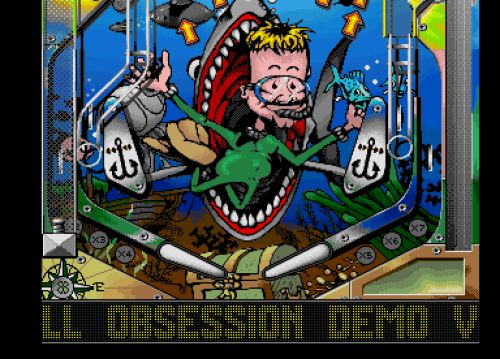Hatari is an Atari ST and STE emulator. The Atari ST was a 16/32 bit computer system which was first released by Atari in 1985.
Hatari tries to emulate the hardware of a ST as close as possible so that it is able to run most ST games and demos. It supports more graphics modes than the ST and does not require an original TOS image (as it supports EmuTOS).
Hatari is an adaption of the WinSTon source code to the SDL library, using the portable UAE CPU core instead of the original, non-portable assembler CPU core.
There is also very experimental hardware emulation of the Atari Falcon, a personal computer released in 1992, and the TT.
Features include:
- 68000 – 68040 emulation via the UAE CPU core.
- Support for all known TOS versions (including EmuTOS).
- ST RAM size variable (from 512kiB up to 14MiB are possible).
- Optional cartridge images for the ST ROM port.
- Most of the ST specific hardware.
- ST Shifter with ST-High, ST-Medium and ST-Low resolutions, overscan effects for all borders in color resolutions.
- 512 color ST palette.
- Many raster effects.
- Scaling of ST-low resolution by factor two.
- Interleaved lines rendering of ST-medium and (scaled) ST-low resolutions for the TV “monitor type”.
- Blitter chip emulation (not very accurate).
- PSG YM2149 emulation (soundchip) including STFM samples.
- Printer emulation on GEMDOS and Hardware level (print to file).
- Experimental support for RS232.
- Experimental MIDI output support (no MIDI input/through support).
- Mega ST real time clock.
- IKBD emulation (keyboard, mouse and joystick) with custom keyboard mapping.
- Joystick emulation via cursor keys and joystick emulation via a connected PC joystick.
- FDC emulation using floppy disk images in standard formats (*.ST, *.MSA and *.DIM).
- Support for packed disk images (PkZip and Gzip).
- Optional write-protection for disk images.
- Partial ACSI emulation for hard disk support.
- GEMDOS interface driver to mount a directory as a hard drive.
- Support for memory snapshots (save whole system state).
- Driver for extended VDI resolutions.
- Recording of sound as .WAV and .YM files.
- Screenshots in .BMP format.
- Animation capturing.
- TOS versions 1.00, 1.02, 1.04 and 2.06 can be used in ST mode.
- Experimental support for the NCR5380 SCSI chip in Falcon and TT mode.
- Very experimental support for the SCC chip of the Mega-STE, TT and Falcon.
- Full support for MMU/MCU RAM configuration at $FF8001.
STE hardware emulation
- Horizontal and vertical hardware fine scrolling.
- Split screen techniques / in-screen video address manipulations.
- (STE specific) right border opening.
- 4096 colors STE palette.
- DMA sample sound (“microwire” audio balance support missing).
- STE joypads.
- TOS versions 1.06, 1.62, 2.05 and 2.06 can be used in STE mode.
Website: hatari.tuxfamily.org
Support: User’s Manual, Mailing Lists
Developer: Nicolas Pomarede, Thomas Huth, Eero Tamminen, Laurent Sallafranque, and many contributors
License: GNU General Public License v2.0
Hatari needs a fast machine (CPU with 1 GHz or more for ST/STE emulation, > 2 GHz for Falcon emulation) which is running a POSIX compatible operating system (preferably Linux) that supports the SDL library.

Hatari is written in C. Learn C with our recommended free books and free tutorials.
Return to Home Computer Emulators
| Popular series | |
|---|---|
| The largest compilation of the best free and open source software in the universe. Each article is supplied with a legendary ratings chart helping you to make informed decisions. | |
| Hundreds of in-depth reviews offering our unbiased and expert opinion on software. We offer helpful and impartial information. | |
| The Big List of Active Linux Distros is a large compilation of actively developed Linux distributions. | |
| Replace proprietary software with open source alternatives: Google, Microsoft, Apple, Adobe, IBM, Autodesk, Oracle, Atlassian, Corel, Cisco, Intuit, and SAS. | |
| Awesome Free Linux Games Tools showcases a series of tools that making gaming on Linux a more pleasurable experience. This is a new series. | |
| Machine Learning explores practical applications of machine learning and deep learning from a Linux perspective. We've written reviews of more than 40 self-hosted apps. All are free and open source. | |
| New to Linux? Read our Linux for Starters series. We start right at the basics and teach you everything you need to know to get started with Linux. | |
| Alternatives to popular CLI tools showcases essential tools that are modern replacements for core Linux utilities. | |
| Essential Linux system tools focuses on small, indispensable utilities, useful for system administrators as well as regular users. | |
| Linux utilities to maximise your productivity. Small, indispensable tools, useful for anyone running a Linux machine. | |
| Surveys popular streaming services from a Linux perspective: Amazon Music Unlimited, Myuzi, Spotify, Deezer, Tidal. | |
| Saving Money with Linux looks at how you can reduce your energy bills running Linux. | |
| Home computers became commonplace in the 1980s. Emulate home computers including the Commodore 64, Amiga, Atari ST, ZX81, Amstrad CPC, and ZX Spectrum. | |
| Now and Then examines how promising open source software fared over the years. It can be a bumpy ride. | |
| Linux at Home looks at a range of home activities where Linux can play its part, making the most of our time at home, keeping active and engaged. | |
| Linux Candy reveals the lighter side of Linux. Have some fun and escape from the daily drudgery. | |
| Getting Started with Docker helps you master Docker, a set of platform as a service products that delivers software in packages called containers. | |
| Best Free Android Apps. We showcase free Android apps that are definitely worth downloading. There's a strict eligibility criteria for inclusion in this series. | |
| These best free books accelerate your learning of every programming language. Learn a new language today! | |
| These free tutorials offer the perfect tonic to our free programming books series. | |
| Linux Around The World showcases usergroups that are relevant to Linux enthusiasts. Great ways to meet up with fellow enthusiasts. | |
| Stars and Stripes is an occasional series looking at the impact of Linux in the USA. | |
